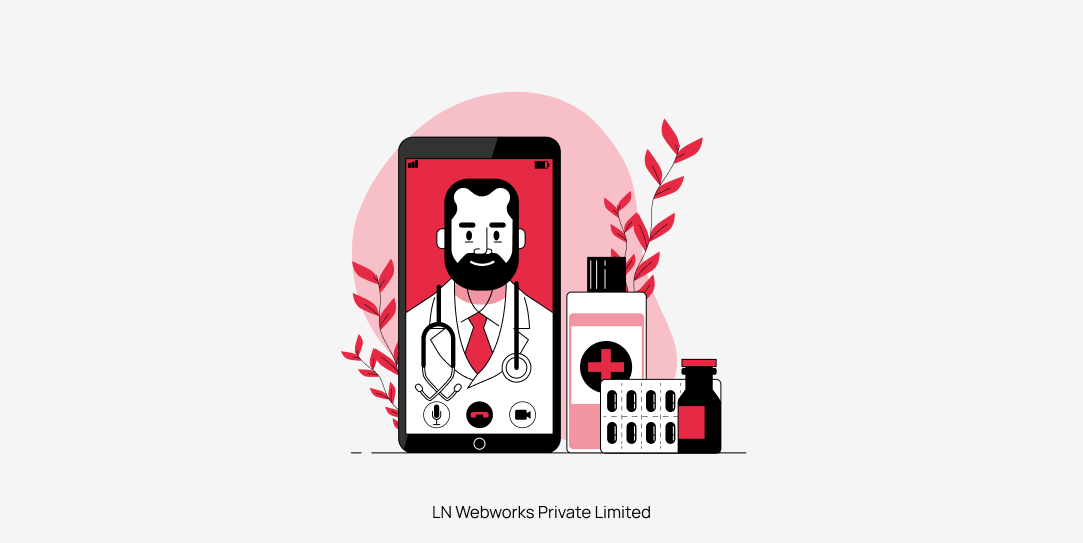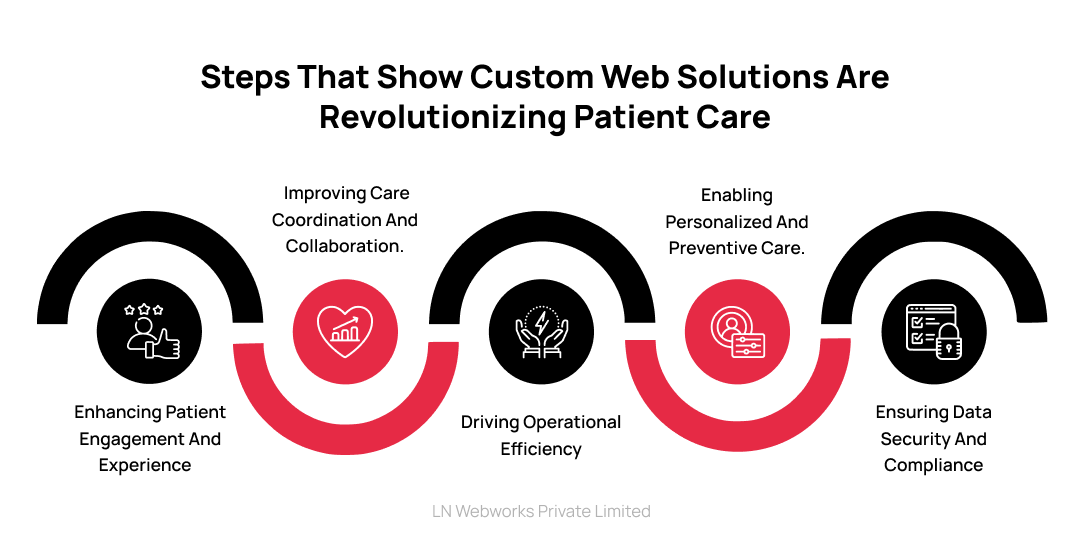Digital Transformation in Healthcare: How Custom Web Solutions Are Revolutionizing Patient Care

Companies in healthcare are trying to run faster, link various systems, and become more efficient. Working closely with technology is having an important impact. However, digital transformation covers much more than just installing upgraded software, as it aims to improve the way healthcare is delivered.
All over the U.S., healthcare providers are facing difficulties: patients want better service, there are not enough staff, and following rules, such as those set by HIPAA(Health Insurance Portability and Accountability Act), is not an option. Many times, old legacy systems end up making operations slow, making things difficult rather than making them better.
Custom web solutions are useful, as they solve problems deeply and are beneficial for years to come. Since these platforms are adapted to clinical requirements, they are making it easier to provide more efficient and secure care.
Most importantly, they help transform the way patients get medical care. The medical world is being brought closer to the digital world through digital tools, which now support more personal, responsive, and accessible care.
Just what are the real changes happening within the industries? Let’s dive into how custom digital platforms are transforming healthcare from the inside out.
Steps that show Custom Web Solutions Are Revolutionizing Patient Care

Digital transformation in healthcare isn’t just about putting records online or offering appointment booking. It’s about reimagining every touchpoint in the care journey, from the front desk to post-discharge follow-ups. Here’s how custom web solutions are making that happen.
1. Enhancing Patient Engagement and Experience
Today’s patients are no longer passive recipients of care. They’re informed, digitally literate, and expect to be active participants in their health journey.
Custom web platforms give patients the tools to:
- Book appointments online at their convenience
- Access test results and medical history through secure portals
- Communicate directly with care teams via messaging or video.
- Receive automated reminders for medications or follow-ups.
These experiences empower patients while reducing administrative strain. In addition, building a custom interface allows it to match a company’s brand and set of values, something few off-the-shelf systems can do.
Any provider who wants to expand and have control over the project can depend on healthcare Drupal website development as a strong foundation. The modular design of Drupal supports HIPAA compliance and lets clinics integrate important applications and deliver content in several languages.
2. Improving Care Coordination and Collaboration
Fragmentation is one of the biggest problems that remains in healthcare. Although patients may go to several healthcare providers, their important information is kept in different systems.
Custom web solutions solve this by:
- Creating centralized portals that unify patient data
- Enabling real-time updates across departments and facilities
- Supporting collaborative care plans and shared notes
- Integrating securely with third-party systems via APIs
The outcome is a leaner form of communication, quicker decision making, and reduced errors that might have come as a result of miscommunication or even incomplete records. This interlinked strategy has a direct relation to improved clinical outcomes and patient safety.
3. Driving Operational Efficiency
Operation bottlenecks frustrate employees and delay patient care, besides increasing the cost of treatment. Through digital transformation, healthcare leaders can automate time-consuming tasks and maximize their resources.
Custom solutions can:
- Automate patient intake and pre-visit screenings
- Digitize consent forms and insurance verification
- Offer staff-friendly scheduling tools and resource tracking.
- Provide real-time performance dashboards for management.
By removing unnecessary steps from workflows, providers can reduce wait times, cut down on paperwork, and improve staff productivity—all while enhancing the patient journey from start to finish.
And because these tools are built around real organizational needs, they evolve as the business grows, avoiding the bloat or limitations common in generic software platforms.
4. Enabling Personalized and Preventive Care
Thanks to digital transformation, the industry can start paying more attention to disease prevention than to treatment alone.
AI-based analytics provide custom web solutions with many benefits.
- Track vital health metrics in real time.
- Identify patterns and high-risk patients early.
- Send personalized alerts or lifestyle tips to the patients.
- Enable providers to deliver more targeted care plans.
For example, a diabetes management platform might integrate patient glucose readings with lifestyle data and send alerts when trends suggest a risk of complications. This sort of predictive, proactive care was difficult to scale before digital tools made it feasible.
The personalization doesn’t stop at data. Custom interfaces can adapt to user needs, from accessibility options for older patients to multilingual content for diverse communities, making care more inclusive and effective.
5. Ensuring Data Security and Compliance
Because data is moving into digital systems, risks to healthcare are also rising. A major reason to safeguard PHI(Protected Health Information) is that its security risks are rising due to cyberthreats; regulations from HIPAA(Health Insurance Portability and Accountability Act) help keep it protected.
Special web solutions are well placed to solve this since securing them is always done during development, not added on later.
Key features include:
- End-to-end encryption and secure hosting environments
- Role-based access controls and multi-factor authentication
- Built-in audit trails and activity monitoring
- Timely software updates and regular security reviews
A tailored solution also allows providers to align security measures with specific operational policies. It gives compliance needs, giving IT teams full control over who sees what, and when.
Concluding: The Future of Healthcare Transformation
The process of digital transformation in healthcare does not have an end. Because of the rise of AI diagnostics, wearable health trackers, and connected devices, more and more people will look for smooth and adaptable digital systems.
Future-ready providers are investing in web solutions that not only meet current needs but can scale and adapt to future demands.
Whether it’s expanding telemedicine capabilities, integrating smart devices, or launching patient education portals, custom development by experienced partners like LN Webworks is what enables these advancements to thrive within the organization’s larger ecosystem.
Most importantly, these investments are about more than technology. They’re about restoring focus on what truly matters: delivering safe, responsive, patient-first care in a digital age.
Contact us today for a personalized consultation!
